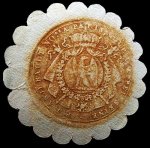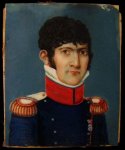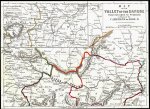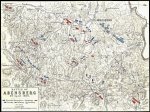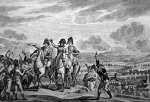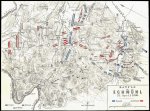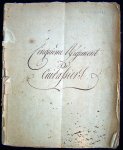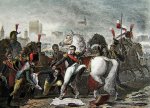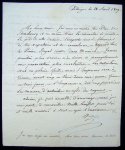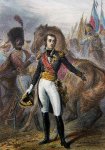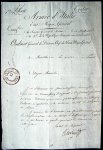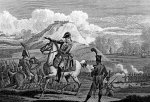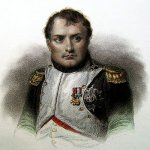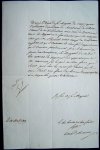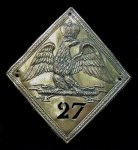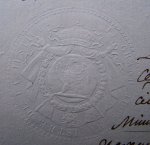Eckmuhl
While Lannes was away in Spain, the Austrians declared war on France. After the siege of Saragossa he was ordered to return to France where he would receive orders for yet another campaign. He arrived in Paris on the 9th of April 1809, and would only stay a few days. While there he visited with Josephine who noticed that he had returned from Spain a changed man. Lannes had a feeling that his time was running out and that this campaign would be his last.
On the 19th of April, Lannes arrived at Neustadt where Napoleon had established his headquarters. His first order was to attack Archduke Louis before the Austrian reached Ratisbon. In this task Lannes would take two divisions from Davout, Nansouty’s cuirassiers, and Jaciunot’s light cavalry. When Lannes came upon the Austrians, he went on the attack, and the enemy retreated to Landshut. Lannes advanced on Lanshut with Nansouty, Morland, Vandamme, and Wrede’s Bavarian division. After defeating the Austrians he crossed the Isar and marched on Eckmuhl, where Archduke Charles had positioned his 110,000 troops. The battle was mainly fought by Davout and Lefebvre, while Lannes rounded up fleeing Austrians. During the battle he would lose one of his closest friends in Cervoni, who was killed by a cannon ball.
The next obstacle was the town of Ratisbon, which would be difficult on the account of its high ancient walls that protected Austrian sharpshooters and artillery. On the 23rd of April, Gudin tried to ladder the walls but was beat back. Time and time again the assaults failed with Austrians sharpshooters hitting their French marks. During the assault, Lannes used up all those who had volunteered, so in a bit of rage he grabbed a ladder and headed for a breach. His aides managed to stop him, but the affect worked, and some grenadiers were able to strorm the breach and enter the town. Once inside the they opened the gates, and this allowed Lannes to enter with the remaining troops. Once inside the French had to fight their way through the streets to reach and secure the bridges over the Danube, which was located on the other side of the town. When he reached the bridges, Lannes found Archduke Charles on the other side of the Danube.
After the battle Lannes was given the 2nd Corps located at Landshut, and during the next few weeks the they would repair bridges and engage in small skirmishes with the Austrians. Lannes soon reached the outskirts of Vienna with Napoleon, where Hiller was in command of the city’s garrison. After a brief show of force, Hiller opened the city to the French on the 13th of May. It was now time to face Archduke Charles, but his army was on the other side of the Danube. The French would now have to build bridges and fight at the same time.
THE TIMES OF LONDON
May 8, 1809
Paris, April 22
The Austrian Ambassador, Count METTERNICH, has obtained his passports, and set off this day on his return to Vienna. The Duke of MONTEBELLO, General ANDREOSSY, and the Grand Duchess of BADEN, the Princess STEPHANIE, have arrived at Strasburg.
THE TIMES OF LONDON
May 11, 1809
THE FIRST BULLETIN OF THE GRAND ARMY
Ratisbon, April 24
The Austrian army passed the Inn on the 9th of April: that was the signal for hostilities; and Austria declared an implacable war against France and her Allies, and the Confederation of the Rhine. The following were the positions of the French army and her allies:–The Corps of the Duke of AUERSTADT at Ratisbon. The corps of the Duke of RIVOLI at Ulm. The corps of General OUDINOT at Augsburgh. The head-quarters at Strasburgh. The three divisions of Bavarians, under the Duke of DANTZIC, were placed as follows:–The first division, commanded by the Prince ROYAL, at Munich; the second, by General DEROI, at Landshut; and the third, by General DE WREDE, at Strasburgh. The Wurtemburgh division at Heydenheim. The Saxon troops encamped under the walls of Dresden.
The corps of the Duchy of Warsaw, commanded by Prince PONIATOWSKI, in the environs of Warsaw. On the 10th the Austrian troops invested Passan, where they surrounded a battalion of Bavarians, and at the same time invested Kufftein, where there was another battalion of Bavarians; these movements took place without even a shot being fired. The Austrians published the subjoined Proclamtion at the Tyrol. The Bavarian Court quitted Munich for Dillingen. The Bavarian division which had been at Landshut went to Altorff, on the left bank of the Iser. The division under the command of General DE WREDE, marched upon Neustadt. The Duke of RIVOLI left Ulm for the environs of Augsburgh. From the 10th to the 16th the enemy’s army advanced from the Inn to the Iser; there were several skirmishes between parties of the cavalry, in which the Bavarians were successful. On the 16th, at Phaffenhoffen, the 2d and 3d regiments of Bavarian light horse completely routed the hussars of Stipschitz and the Rosenberg dragoons. At the same time the enemy appeared in large bodies for the purpose of forming at Landshut; the bridge was broken down, and the Bavarian division, commanded by General DEROI, vigorously opposed this movement of the enemy, but being threatened by the columns which had passed the Iser; at Moorberg and Freysing, this division retired in good order upon that of General WREDE, and the Bavarian army took central position upon Neustadt.
DEPARTURE OF THE EMPEROR FROM PARIS ON THE 13th.
The EMPEROR learnt by the telegraph, in the evening of the 12th, that the Austrians had passed the In, and he set out from Paris almost immediately. He arrived at three o’clock on the morning of the 16th at Louisburg, and in the evening of the same day at Dillengen, where he saw the King of BAVARIA, and passed half an hour with the PRINCE, and promised in fifteen days to restore him to his capital, to revenge the insults which had been offered to his House, and to make him greater than any of his ancestors had ever been. On the 17th, at two o’clock in the morning, his MAJESTY arrived at Donauwerth, where he immediately established his head-quarters, and gave the necessary orders. On the 18th the head-quarters were removed to Ingolstadt.
BATTLE OF PHAFFENHOFFEN ON THE 19th.
On the 19th General OUDINOT quitted Augsburgh and arrived by break of day at Phaffenhoffen, where he met 3 or 4000 Austrians, whom he attacked, and took 300 prisoners. The Duke of RIVOLI arrived the next day at Phaffenhoffen. The same day the Duke of AUERSTADT left Ratisbon to advance to Neustadt, and to draw near to Ingolstadt. It was then evident that the plan of the EMPEROR was to out manoeuvre the enemy, who had formed near Landshut, and to attack them at the very moment when they, thinking they were commencing the attack, were marching to Ratisbon.
BATTLE OF TANN ON THE 19th.
On the 19th, by break of day, the Duke of AUERSTADT began his march in two columns. The division of MORAND and GUDIN formed his right, the divisions of ST. HILAIRE and FRIANT formed his left. The division of ST. HILAIRE arrived at the village of Pressing, and there met the enemy, superior in number, but inferior in bravery, and there the campaign was opened by a battle, which was most glorious to our arms. General ST. HILAIRE, supported by General FRIANT, overturned every thing that was opposed to him, and took all the positions of the enemy, killed a great number of them, and made between 600 and 700 prisoners. The 72d regiment distinguished itself on that day; the 57th maintained its ancient reputation. Sixteen years ago, this regiment obtained in Italy the name of the Terrible. In this action they maintained their pretensions to that title; they attacked singly six Austrian regiments in succession, and routed them.
On the left at two o’clock in the afternoon, General MORAND also fell in with an Austrian division, which he attacked in front, while the Duke of DANTZIC, with a corps of Bavarians, which had marched from Abensberg, attacked them in the rear. This division was soon driven from all its positions, and left several hundreds in killed and prisoners. The whole regiment of the dragoons of Levenher was destroyed, and its colonel killed, by the Bavarian light horse. At sun set, the division of the Duke of DANTZIC formed its junction with that of the Duke of AUERSTADT. In all these affairs Generals ST. HILAIRE and FRIANT particularly distinguished themselves. Those unfortunate Austrian troops who had been led from Vienna with music and the songs, and under a persuasion that there was no longer any French army in Germany, and that they would only have to deal with Wirtemburghers and Bavarians, displayed in the strongest manner the resentment they felt against their Chiefs, for the error into which they had been led; and their terror was the greater when they saw those old bands which they had been accustomed to consider as their master. In all these battles our loss was inconsiderable, compared with that of the enemy, who lost a number of General Officers and others, who were obliged to put themselves forward to give courage to their troops. The Prince of LICHTENSTEIN, General LUSIGNAN, and others were wounded. The loss of the Austrians in Colonels and Officers of low rank was considerable.
BATTLE OF ABENSBERG ON THE 20th.
The EMPEROR resolved to beat and destroy the corps of Archduke LOUIS, and General KELLER, which amounted to 60,000 men. On the 20th, his MAJESTY took post at Abensberg; he gave orders to the Duke of AUERSTADT to keep the corps of Hohenzollern, of Rosenberg, and Lichtenstein, in check, while with the two divisions of MORAND and GUDIN, the Bavarians and the Wirtemburghers, he attacked the army of the Archduke LOUIS and General KELLER in front, and caused the communications of the enemy to be sent off by the Duke of RIVOLI, who passed by Freyberg, and from thence proceeded to the rear of the Austrian army. The divisions of MORAND and GUDIN formed the left, and manoeuvred under the orders of the Duke of MONTEBELLO.
The EMPEROR determined to fight that day at the head of the Bavarians and Wirtemburghers. He ordered the officers of these two armies to form a circle, and addressed them in a long speech. The Prince ROYAL of Bavaria translated into German what he said in French. The EMPEROR made them sensible of the confidence which he reposed in them. He told the Bavarian Officers that the Austrians had always been their enemies; that they now wished to destroy their independence; that for more than 200 years the Bavarian standard had been displayed against the Austrians. But that this time he would render them so powerful, that they alone should be able to contend with the House of Austria. He spoke to the Wirtemburghers of the victories they had obtained over the House of Austria, when they served in the Prussian army, and of the advantages which they had recently obtained from the campaign in Silesia. He told them all, that the moment had come for carrying the war into the Austrian territory. This speech was repeated to the different Companies by the Captains, which produced an effect which may easily be conceived. The EMPEROR then gave the signal for battle, and planned his manoeuvres according to the particular character of the troops. General WREDE, a Bavarian Officer of great merit, was stationed at Siegenburgh, and attacked an Austrian division, which was opposed to him. General VANDAMME, who commanded the Wirtemburghers, attacked the enemy on their right flank. The Duke of DANTZIC, with the division of the Prince ROYAL, and that of General DEROI, marched towards the village of Reuhausen, in order to reach the grand road from Abensberg to Landshut. The Duke of MONTEBELLO, with his two French divisions, forced the extremity of the enemy’s left, and overthrew every thing that was opposed to him, and advanced to Rohr and Rosenburgh. Our cannonade was successful on all points. The enemy, disconcerted by our movements, did not fight for more than an hour, and then beat a retreat. Eight standards, 12 pieces of cannon, and 18,000 prisoners, were the result of this affair, which cost us but a few men.
THE BATTLE OF LANDSHUT AND THE TAKING OF THAT PLACE.
The battle of Landshut having laid open the flank of the Austrian army, and all their magazines, the EMPEROR, by break of day on the 21st, marched upon Landshut. The Duke of ISTRIA defeated the enemy’s cavalry in the plain before that city. The general of Division MOUTON made the grenadiers of the 17th advance to the charge on the bridge, forming the head of a column. The bridge was of wood, was set on fire, but that was not an obstacle to our infantry, who forced it, and penetrated into the city. The enemy, driven from their position, were then attacked by the Duke of RIVOLI, who had advanced by the right bank. Landshut fell into our power, and with Landshut we took 30 pieces of cannon, 9,000 prisoners, 600 ammunition waggons, 3,000 baggage waggons, and the hospitals and magazines which the Austrians had began to form. Some Couriers and Aides-de-Camp of the Commander in Chief, Prince CHARLES, and some convoys of wounded men, coming from Landshut, also fell into our hands.
BATTLE OF ECKMUHL ON THE 22d.
While the battle of Abensberg and that of Landshut produced such important consequences, the Archduke CHARLES had formed a junction with the Bohemian army under KOLLOWRATH, and obtained some partial success at Ratisbon. One thousand of the 65th, who were left to guard the bridge of Ratisbon, and who had not received orders to retreat having expended their cartridges, and being surrounded by the Austrians, were obliged to surrender. This event made an impression upon the EMPEROR, and he swore that in 24 hours Austrian blood should flow in Ratisbon, to resent the insult which had been offered to his arms. During this time the Dukes of AUERSTADT and DANTZIC held in check the corps of Rosenberg, Hohenzollern, and Lichtenstein. There was no time to be lost.
The EMPEROR began his march from Landstut, with the two divisions of the Duke of MONTEBELLO, the corps of the Duke of RIVOLI, the Cuirassiers of NANSOUTY and ST. SULPICE, and the Wirtemburgh division. At two o’clock in the afternoon they arrived opposite Eckmuhl, where the four corps of the Austrian army, consisting of 110,000 men, had taken a position under the command of the Archduke CHARLES. The Duke of MONTEBELLO attacked the enemy on the left, with the division of GUDIN. On the first signal the divisions of the Dukes of AUERSTADT and DANTZIC, and the division of light cavalry of General MONTBRUN, took their position. One of the most beautiful sights which war can present then presented itself, 110,000 men attacked on all points, turned on their left, and successively driven from all their positions. The detail of the events would be too long; it is sufficient to say, that the enemy was completely routed; that they lost the greater part of their cannon, and a great number of prisoners; and that the Austrians, driven from the woods which cover Ratisbon, were forced into the plain, and cut off by cavalry. The Austrian cavalry, strong and numerous, attempted to cover the retreat of their infantry, but they were attacked by the division of ST. SULPICE on the right, and by the division of NANSOUTY on the left, and the enemy’s line of hussars and cuirassiers routed; more than 300 Austrian cuirassiers continued their march to Ratisbon. The division of NANSOUTY met with a column of the enemy, which was escaping, and attacked it, and compelled it to surrender: it consisted of three Hungarian battalions of 1,500 men. The division of ST. SULPICE charged another division of the enemy, where Archduke CHARLES narrowly escaped being taken. He was indebted for his safety to his fleetness of his horse. This column was also broken and taken. Darkness at length compelled our troops to halt. In this battle of Eckmuhl not above half of the French troops were engaged. The enemy, closely pressed, continued to defile the whole of the night in small divisions, and in great confusion. All their wounded, the greater part of their artillery, 15 standards, and 20,000 prisoners, fell into our hands.
BATTLE OF RATISBON, AND THE CAPTURE OF THAT PLACE
On the 23d, at break of day, the army advanced upon Ratisbon; the advanced guard, formed by the division of GUDIN, and by the cuirassiers of NANSOUTY and ST. SULPICE, and they very soon came in sight of the enemy’s cavalry, which attempted to cover the city. Three successive charges took place, all of which were to our advantage. Eight thousand of their troops having been cut to pieces, the enemy precipitately repassed the Danube. During these proceedings, our light infantry tried to get possession of the city. By a most unaccountable disposition of his force, the Austrian General sacrificed six regiments there without any reason. The city surrounded with a bad wall, a bad ditch, and a bad counterscarp. The artillery having arrived, the city was battered with some 12 pounders. It was recollected that there was one part of the fortifications where, by means of a ladder, it was possible to descend into the ditch, and to pass on the other side through a breach in the wall. The Duke of MONTEBELLO caused a battalion to pass through this opening; they gained a position, and introduced themselves into the city. All those who made resistance were cut to pieces: the number of prisoners exceeded 8,000. In consequence of these unskillful dispositions, the enemy had no time to destroy the bridge, and the French passed pell-mell with them to the left bank. This unfortunate city, which they were barbarous enough to defend, has suffered considerably. A part of it was on fire during the night, but by the efforts of General MORAND and his division, it was extinguished. Thus, at the battle of Abensberg, the EMPEROR beat separately the two corps of the Archduke LOUIS and General KELLER. At the battle of Landshut, he took the centre of their communications, and the general depot of their magazines and artillery; finally, at the battle of Eckmuhl, the four corps of Hohenzollern, Rosenberg, Kollowrath, and Lichtenstein, were defeated. The corps of General BELLEGARDE arrived the day after the battle; they could only be witnesses of the taking of Ratisbon, and then fled into Bohemia. In all these battles our loss amounted to 1,200 killed, and 4,000 wounded.
General of Division CERVONI, Chief of Staff to the Duke of MONTEBELLO, was hit by a cannonball, died, and is buried on the battlefield of Eckmuhl; he was on officer of merit who served with distinction in our first campaigns. In the combat of Peising, General HERVO, Chief of Staff of the Duke of AUERSTADT, was also killed. The Duke of AUERSTADT regrets this officer whose bravery, intelligence and activity he admired. General of Brigade CLEMENT, in command of a brigade of cuirassiers of the ST. SULPICE division, had an arm taken off; he is an officer of courage and distinguished merit. General SCHRAMM was wounded. The colonel of the 14th chasseurs was killed in a charge. Altogether our loss in officers is not very considerable. The 1,000 men of the 65th who had been made prisoner have been for the most part retaken. It is impossible to show more bravery and good will than that shown by the troops. At the battle of Eckmuhl, the corps of the Duke of RIVOLI, having been unable to rejoin, this Marshal stayed constantly near the EMPEROR; it took orders and provided the execution of different manoeuvres. During the assault of Ratisbon, the Duke of MONTEBELLO, who had designated the area of passage , had ladders carried by his Aides-de-Camp. The Prince of NEUFCHATEL, in order to encourage the troops and at the same time give proof of confidence to the allies, marched several times to the advance guard with the Bavarian regiments. The Duke of AUERSTADT has given, in these different affairs, new proofs of his well known intrepidity. The Duke of ROVIGO, with as much zeal as intrepidity, crossed several times the many legions, to appraise the different columns of the intention of the EMPEROR. Of 222,000 of which the Austrian army was composed, all have been engaged, except 20,000 men, commanded by General BELLEGARDE. On the other hand, near one half of the French army has not fired a shot. The enemy, astonished by rapid movements, which were out of their calculation, were in a moment deprived of their foolish hopes, and precipitated from delirium of presumption to a despondency approaching to despair.
THE TIMES OF LONDON
May 11, 1809
THE SECOND BULLETIN OF THE GRAND ARMY
Muhldorff, April 27
On the 22d, the day after the battle of Landshut, the EMPEROR left that city for Ratisbon, and fought the battle of Eckmuhl. At the same time he sent the Duke of ISTRIA with the Bavarian division under General WREDE, and MOLITOR’S division to proceed to the Inn, and pursue the two corps of the Austrian army beaten at Abensberg and Landshut. The Duke of ISTRIA arrived successively at Wilsburg and Neumark, found there upwards of 400 carriages, caisons and equipage abd took from 15 to 1,800 prisoners in his march.
The Austrians corps found beyond Neumark, a corps of reserve which had arrived upon the Inn. They rallied, and on the 25th gave battle at Neumark, where the Bavarians, notwithstanding their extreme inferiority, preserved their positions. On the 24 the EMPEROR had sent the corps of the Duke of RIVOLI from Ratisbon to Straubing, and from thence to Passau, where he arrived on the 26th. The Duke made the battalion of the Po pass the Inn–it made 300 prisoners, removed the blockade of the citadel, and occupied Scharding. On the 25th the Duke of MONTEBELLO had orders to march with his corps from Ratisbon to Muhldorff. On the 27th he passed the Inn and proceeded to the Salza. Today, the 27th, the EMPEROR has his head quarters at Muhldorff. The Austrian division, commanded by General JELLACIC, which occupied Munich, is pursued by the corps of the Duke of DANTZIC. The King of BAVARIA has shewn himself at Munich–He afterwards returned to Augsburg, where he will remain somedays, intending not to fix his residence at Munich till Bavaria shall be entirely delivered from the enemy. On the side of Ratisbon, the Duke of AUERSTADT is gone in pursuit of Prince CHARLES, who, cut off from his communications with the Inn and Vienna, has no other resource than that of retiring into the mountains of Bohemia, by Waldmunchen and Cham. With respect to the Emperor of AUSTRIA, he appears to have been before Passau, in order to besiege that place with three battalions of the Landwelk. All Bavaria and the Palatinate are delivered from the presence of the enemy. At Ratisbon, the EMPEROR passed several corps in review, and caused the bravest soldiers to be presented to him, to whom he gave distinctions and pensions, and the bravest officers, to whom he gave Baronies and lands. Hitherto the EMPEROR has carried on the war almost without equpage and guards; and it has been remarked, that in the absence of his guard, he had always about him the allied Bavarian and Wirtemberg troops; wishing thereby to give a particular proff of confidence. A report has been circulated that the EMPEROR had his leg broken–The fact is, that a spent ball grazed the heel of his boot, but did not touch the skin. Never was his MAJESTY in better health, though in the midst of the greatest fatigue.
It has been remarked as a singular fact, that one of the first Austrian officers, made prisoners in this war, was the Aide-de-Camp of Prince CHARLES, sent to M. OTTO with the famous letter, purporting that the French army must retire. The inhabitants of Ratisbon having behaved very well, and evinced that patriotic and confederated spirit which we have a right to expect from them, his MAJESTY has ordered that the damages done shall be repaired at his expense, and particularly the rebuilding of the houses burnt; the expense of which will be several millions. All the sovereigns and territories of the Confederacy evince the most patriotic spirit–When the Austrian Minister at Dresden delivered the declaration of his Court to the King of SAXONY, the latter could not contain his indignation–‘You wish for war, and against whom? You attack and you inveigh against a man, who, three years ago, master of your destiny, restored your states to you. The proposals made to me afflict me; my engagements are known to all in Europe; no Prince of the Confederacy will detach himself from them.’ The Grand Duke of WURTZBURG, the Emperor of Austria’s brother, has shewn the same sentiments, and has declared that if the Austrians advanced to his territories, he should retire, if necessary, across the Rhine–so well are the insanity and the invectives of Vienna appreciated! The regiments of the petty Princes, all the allied troops are eager to march against the enemy. A notable circumstance, which posterity will remark as a fresh proof of the signal bad faith of Austria, is, that on the day she wrote the annexed Letter to the King of BAVARIA, she published, in the Tyrol, the Proclamation signed by General JELLACIC.–On the same day she proposed to the King to be neutral, and invited his subjects to rise. How can we reconcile this contradiction, or rather how justly this infamy?
THE TIMES OF LONDON
May 15, 1809
THE THIRD BULLETIN OF THE GRAND ARMY
Burghausen, April 30
The EMPEROR arrived in Muhldorff the 27th inst. in the evening. His MAJESTY detached the division of General WREDE to Laufen on the Salza, in order to overtake the corps, which the enemy had in Tyrol, and which was retreating by forced marches. General WREDE overtook the enemy’s rear on the 28th, near Laufen, took their baggage, and made many prisoners; but the enemy had sufficient time to cross the river and burn the bridge. On the 27th the Duke of DANTZIC arrived in Wanesburg and the 28th in Altenmarkt. On the 29th General WREDE continued his march to Saltzburgh; about three leagues from the town, he found the advance posts of the enemy’s army. The Bavarians pursued them closely, and entered the town with them. General WREDE assures, that the division of General JELLACIC is completely destroyed. That General has thus been punished for the scandalous Proclamation, by which he put the dagger in the hands of the Tyrolese. The Bavarians have taken 500 prisoners, and found considerable magazines in Saltzburgh. On the 28th, at day break, the Duke of ISTRIA arrived in Burghausen, and his advanced parties took post on the right bank of the Inn.
The same day the Duke of MONTEBELLO arrived in Burghausen. Count BERTRAND exerted himself to the utmost to restore the bridge, which has been burnt by the enemy. It was completed on the 30th, and the whole army crossed the river. On the 28th a detachment of 50 horse chasseurs commanded by Captain MARGAROU, arrived in Dittmoning, where he fell in with a battalion of the famous militia, styled Landwehr, which, on his approach, retreated into a neighbouring wood. Captain MARGAROU summoned them to surrender; after much deliberation, 1,000 men of that valiant militia, posted in a thick wood, altogether inaccessible to cavalry, surrendered to 50 chasseurs.
The EMPEROR wished to see them; they really excite compassion; they are badly armed, worse accoutered, , and commanded by retired officers of artillery. The cruel and overbearing temper of the Austrians fully displayed itself during the moment of apparent success, when they occupied Munich. The High Bailiff of Muhldorf was arrested by them and shot. An inhabitant of Mulhdorf, of the name of STARCK, who had obtained a badge of distinction from the King of BAVARIA, for the services which, during the last war, he rendered to the army, has been taken up and sent to Vienna, to stand his trial. The High Bailiff of Burghausen, Count ARMANSPERG, has also been sent to Lintz, and from thence to Vienna, because in the year 1805, he did not comply with a requisition, addressed to him on the part of the Austrians. The Bavarians will, no doubt, give a minute and faithful account of the acts of wanton cruelty committed by the Austrians in this country, that the memory there of may be preserved by their most remote posterity, although it is extremely probable that this is the last insult which Austria will be able to offer to the allies of France. The Austrians have endeavoured, both in the Tyrol and Westphalia, to invite the inhabitants to rise in rebellion against their Sovereigns. Austria has raised numerous armies divided into corps like the French army; her troops are moving by forced marches, to imitate the French troops; her Generals are publishing bulletins, proclamations, general orders–all in imitation of the French. But the ass is not ennobled to a lion, because he is covered with a lion’s skin; the long ears betray the ignoblet beast. The Emperor of AUSTRIA has left Vienna, and, on his departure, published a proclamation, drawn up by Gentz, in the style and spirit of the most ridiculous performances of that kind. He is gone to Scharding, a position extremely well adapted for a Sovereign, who neither wishes to be in his capital to govern his dominions, nor in the field, where he is known to be merely an encumbrance and dead weight. When he was informed of the result of the battle of Eckmuhl, he judged it prudent to leave the banks of the Inn, and retire into the interior of his dominions. The town of Scharding, which is now occupied by the Duke of RIVOLI, has suffered much. The Austrians in their retreat set fire to their magazines, and burnt half the town, which belonged to them. They had, no doubt, some presentiment of their future fate, that what belonged to Austria shall no longer belong to her.
THE TIMES OF LONDON
May 22, 1809
THE FIFTH BULLETIN OF THE GRAND ARMY
Enns, May 4
On the 1st of May General OUDINOT, after having made 1400 prisoners, penetrated beyond Ried, where he took 400 more, so that he this day took 1,500 men without firing a single gun. The town of Brannau was a strong place of sufficient importance, since it commanded a bridge on the river which forms the frontier of Austria.
In a spirit of inconsistency, worthy this weak cabinet, it destroyed a fortress situated on a frontier where it might be of great utility, in order to build one at Comora, in the midst of Hungary. Posterity will with difficulty credit this excess of inconsistency to folly. The EMPEROR arrived at Ried on the 2d of May at one in the morning, and left at Lambach, at one in the afternoon of the same day. At Ried were found an establishment of eight military ovens, and magazines containing 20,000 quintals of flour. The bridge of Lambach, on the Traun, had been cut by the enemy; it was re-established during the day. On the same day the Duke of ISTRIA, commanding the cavalry, and the Duke of MONTEBELLO, with the corps of OUDINOT, entered Wels. In this town were found a Bakery, 12 or 15,000 quintals of flour, and magazines of win and brandy. The Duke of DANTZIC, who arrived the 30th of April at Saltzburg, instantly caused one bridge to march towards Fufstein, and another towards Rastadt, in the direction of the Italian roads. His advanced guard, pursued General JELLACIC, forced him from the strong post at Colling. On the 1st of May, the head quarters of the Duke of RIVOLI were at Scharding. Adjutant General TRINQUALYE, commanding the advanced guard of the division of ST. CYR, met at Reidau on the road to Neumarck with the advanced guard of the enemy. The Wurtemberg light horse, the Baden dragoons, and three companies of Voltigeurs of the 4th regiment of the French line, as soon as they perceived the enemy, attacked, and pursued him to Neumarck. They killed 50 men, and took 500 prisoners. The Baden dragoons valiantly charged an half battalion of the regiment of JORDIS, and compelled them to lay down their arms. Lieut. Colonel D’EMMERADE, who commanded them, had his horse pierced with stabs from the bayonet. Major SAINTE CROIX took with his own hand a flag from the enemy.
Our loss consists of three men killed, and 50 wounded. The Duke of RIVOLI continued his march on the 2d, and arrived at Lintz on the 3d. The Archduke LOUIS and General HILLER, with the remains of their corps reinforced by a reserve of grenadiers, and by all that the country could afford them, were before the Traum with 35,000 men; but menaced with being turned by the Duke of MONTEBELLO, they proceeded to Ebersberg, in order to pass the river. On the 3d, the Duke of ISTRIA and General OUDINOT marche towards Ebersberg, and effected a junction with the Duke of RIVOLI. They met the Austrian rear guard before Ebersberg. The intrepid battalions of the tirailleurs of the PO, and the Corsican tirailleurs, pursued the enemy, who was passing the bridge, drove into the river the cannon, waggons, and from eight to nine hundred men, and took in the town from three to four thousand men, who the enemy has left there for its defense. General CLAPAREDE, whose advanced guard was three batalions, pursued them. He halted at Ebersberg, and found 30,000 Austrains occupying superb position. The Duke of ISTRIA passed the bridge with his cavalry, in order to support the division, and the Duke of RIVOLI ordered his advanced guard to be strengthened by the main body of the army. The remains of the corps of Prince LEWIS and General HILLER were lost without resource. In this extreme danger, the enemy set fire to the town, which was built of wood. The fire spread in an instant in every direction. The bridge was soon enveloped, and the flames seized the joists, which it was necessary to cut. Neither cavalry nor infantry was able to act; and the division of CLAPAREDE alone, with only four pieces of cannon, fought during three hours against 30,000 men. The battle of Ebersberg is one of the finest military occurrences, the memory of which can be preserved by history. The enemy seeing the division of CLAPAREDE cut off without any communication, advanced three times against it, and was always received and stopped by the bayonet. At length, after a labour of three hours, the flames were turned aside, and a passage opened. The General of Division LEGRAND, with the 26th light infantry and the 18th of the line, marched towards the castle, which the enemy had occupied with 800 men. The sappers broke in the doors, and the flames having reached the castle, all who were within perished there. General LEGRAND afterwards marched to the assistance of CLAPAREDE’S division. General DUROSNEL, who advanced to him, and the enemy was obliged to retreat with great haste.
On the first report of these events, the EMPEROR had himself marched up the right shore, with the division of NANSOUTY and MOLITOR. The enemy, who retreated with the greatest rapidity, arrived at night at Enns, burnt the bridge, and continued his flight on the road to Vienna. His loss consists of 12,000 men, of which 7,500 are prisoners. We also possess four pieces of cannon, and two standards. The division of CLAPAREDE, which constitutes a part of the grenadiers of OUDINOT, covered itself with glory. It has lost 300 men killed and 600 wounded. The impetuosity of the tirailleurs of the Po, and the Corsican tirailleurs, attracted the attention of the army. The bridge, the town, and the position at Ebersberg, will be lasting monuments of their courage. The traveller will stop and say: ‘It is here, from these superb positions, from this long bridge, and this castle so strong from its situation, that an army of 35,000 Austrians was driven into flight by 7,000 Frenchmen.’ COEHORN, General of Brigade, an Officer of singular intrepidity, had his horse killed under him. Colonels CARDENAU and LENDY were killed. A company of the Corsican battalion, pursuing the enemy into the woods, made alone 700 prisoners. During the affair of Ebersberg, the Duke of MONTEBELLO arrived at Steyer, where he rebuilt the bridge which the enemy had cut. The EMPEROR sleeps today at Enns, in the castle of Prince AUERSPERG: tomorrow will be spent in rebuilding the bridge. The deputies of the States of Upper Austria were presented to his MAJESTY at his Bivouvac at Ebersberg. The citizens of all classes, and from all the provinces, allow that the Emperor FRANCIS II, is the aggressor: they expect great changes, and admit that the House of Austria has merited all the misfortunes. They accuse, even openly, the feeble, obstinate, and perfidious character of their Sovereign, as the author of their afflictions; they manifest the deepest gratitude for the generosity which the Emperor NAPOLEON shewed towards the capital and countries he had conquered. In common with all Europe, they are indignant at the resentment and hatred which the Emperor FRANCIS has not ceased to nourish against a nation which had been so noble and magnanimous towards him. Thus, in the opinion even of the subjects of our enemy, victory is on the side of the good cause.
THE TIMES OF LONDON
May 22, 1809
THE SIXTH BULLETIN OF THE GRAND ARMY
Saint Polten, May 9
The Prince of PONTE-CORVO, who commands the 9th corps, composed in a great measure of the Saxon army, and which has marched near the Bohemian frontiers, spreading disquietude every where, has caused the Saxon General GUTSCHMITT to march to Egra.
This General has been well received by the inhabitants, whom he has ordered to dismiss the Landswehr. On the 6th, the head quarters of the Prince PONTE-CORVO were at Rets, between Bohemia and Ratisbon. One SCHILL, a sort of robber, who was covered with crimes during the last campaign of Prussia, and who had obtained the rank of Colonel, has deserted from Berlin with his whole regiment, and repaired to Wittemberg, on the Saxon frontier. He has environed that town. General LESTOCQ has issued a Proclamation against him as a deserter. This ridiculous movement was concerted with the party which wished to send fire and blood through Germany. His MAJESTY has ordered the formation of a corps of observation of the Elbe, which will be commanded by the Duke of VALMY, and composed of 60,000 men. The advanced guard is ordered to proceed to Hanau. The Duke of MONTEBELLO crossed the Enns at Steyer on the 4th, and arrived on the 5th at Amstetten, where he met the enemy’s advanced guard. COLBERT, General of Brigade, caused the 20th regiment of horse chasseurs to charge a regiment of Ulans, of whom 500 were taken.
The young LAURISTON, 18 years of age and who but six months ago was a page, after a singular combat, vanquished the Commander of the Ulans, and took him prisoner. His MAJESTY has granted him the decoration of the Legion of Honour. On the 6th, the Duke of MONTEBELLO arrived at Molck, the Duke of RIVOLI at Amstetten, and the Duke of AUERSTADT at Lintz. The remains of the corps of the Archduke LEWIS and General HILLER quitted Saint Polten the 7th. Two thirds passed the Danube at Crems; they were pursued to Mautern, where the bridge was found broken. The other third took the direction of Vienna. On the 8th, the head quarters of the EMPEROR were at St. Polten. The head quarters of the Duke of MONTEBELLO is today at Sigartskirchen. The Duke of DANTZIC is marching from Saltsburg to Inspruck, in order to attack in the rear the detachments which the enemy has still in the Tyrol, and which troubled the frontiers of Bavaria. In the cellars of the Abbey of Molck were found several thousand bottles of wine, which are very useful for the army. It is not till beyond Molck that the wine country begins. It follows from the accounts delivered in, that the army has found since the passage of the Inn, in different magazines of the enemy 40,000 quintals, 400,000 rations of biscuits, and some hundred thousands of rations of bread. Austria had formed these magazines in order to march forward. They have been of great use to us.
THE TIMES OF LONDON
May 27, 1809
THE SEVENTH BULLETIN OF THE GRAND ARMY
Vienna, May 13
On the 10th, at nine in the morning, the EMPEROR appeared before the gates of Vienna, with the corps of Marshal Duke of MONTEBELLO. It was at the same hour, on the same day, and exactly one month after the Austrian army had passed the Inn, and the Emperor FRANCIS II had rendered himself guilty of a perjury, the signal of his ruin. On the 5th of May, the Archduke MAXIMILIAN, brother of the EMPRESS, a young Prince, 26 years of age, Presumptuous and without experience, of an ardent character, assumed the government of Vienna, and issued the annexed proclamations(No.1 and No.2).
It was generally reported in the country, that all the entrenchments which surrounded the capital were fortified, that redoubts had been raised, that entrenched camps had been formed, and that the city was determined to defend itself. The EMPEROR had a difficulty to believe, that a capital, so generously treated by the French army in 1805, and the good sense and wisdom of whose inhabitants are acknowledged, would be so fanatical as to resolve upon so mad an enterprise. He experienced, therefore, a sweet satisfaction when, on approaching the immense suburbs of Vienna, he saw a numerous population of women, children, and old men, run forward to meet the French army, and receive our soldiers as friends. General CONROUX traversed the suburbs, and General THARREAU repaired to the esplanade which separates them from the City. At the instant he reached it, he received by a discharge of musketry and cannon, and was slightly wounded. Of 300,000 inhabitants who composed the population of Vienna, the City, properly so called, which is surrounded by a bastion and a counterscarp, scarcely contains 80,000 inhabitants and 1300 houses. The eight quarters of the town, which have retained the name of suburbs, and are separated from the city by a vast esplanade, and covered on the side of the country by intrenchments, enclose more than 5,000 houses, and are inhabited by more than 200,000, who draw their subsistence from the city, where are the markets and shops. The Archduke MAXIMILIAN had caused registers to be opened for collecting the names of the inhabitants who were willing to defend themselves. Thirty individuals only inscribed their names: all the others refused with indignation. Defeated in his hopes, by the good sense of the People of Vienna, he collected ten battalions of the Landwehr and ten battalions of the line, composing a force of from 15,000 to 16,000 men, and threw himself within the place. The Duke of MONTEBELLO sent an Aide-de-Camp with a summons; but some butchers, and a few hundred fellows, satellites of the Archduke MAXIMILIAN, rushed upon the Parliamentaire, and one of them wounded him. The Archduke ordered the wretch who had committed this infamous action to be led in triumph through the city, mounted on the horse of the French officer, and surrounded by the Militia. After this unheard of violation of the rights of nations, the horrid spectacle was seen of one part of the city drawing upon the other part, and citizens directing their arms against their fellow citizens. General ANDREOSSY, appointed Governor of the city, organized in each suburb a municipality, a central committee of provisions, and a national guard, consisting of merchants, manufacturers, and the good citizens of every class, armed to repress proprietors, and evil disposed persons. The Governor General caused a deputation of the eight suburbs to repair to Schonnbrunn. The EMPEROR charged them to proceed to the city in order to carry the annexed letter(No.3) written by Major General Prince of NEUFCHATEL to the Archduke MAXIMILIAN. He recommended the deputies to represent to the ARCHDUKE, that if he continued to fire upon the suburbs, and if a single one of the inhabitants lost his life through his arms, this act of frenzy, this crime against the people, would for ever break the bonds which attach subjects to their sovereigns. The deputation entered the city on the 11th at ten in the forenoon, and their arrival was marked only by the redoubled fire from the ramparts. Fifteen inhabitants of the suburbs perished, and only two Frenchmen were killed.
The patience of the EMPEROR was wearied out. He proceeded with the Duke of RIVOLI to the arm of the Danube which separates the Prutar(the fashionable promenade of Vienna), and ordered two companies of Voltigeurs to occupy a small pavilion on the left bank, in order to cover the raising of a bridge. The battalion of grenadiers which defended the passage was driven back by the Voltigeurs, and by the grape shot of fifteen pieces of artillery. At eight in the evening the pavilion was occupied, and the materials of collected. Captain PORTALES, Aide-de-Camp of the Prince of NEUFCHATEL, and SUSALDI, Aide-de-Camp of General BOUDET, were among the first to swim across the river in order to seek the boats on the opposite shore. At nine in the evening a battery of 20 cannons, raised by Generals BERTRAND and NAVALET, at 100 fathoms from the place, began the bombardment: 1,800 shells were shot in less than four hours, and soon the whole appeared to be in flames. One must have seen Vienna, its houses of eight or nine stories, its narrow streets, and numerous population within so narrow a compass, in order to form an idea of the tumult, disorder,and disasters which such an operation could not but occasion. The Archduke MAXIMILIAN had, at one in the morning, caused two battalions to march in close column, in order to attempt retaking the Pavilion, which covered the raising of the bridge. The two companies of voltigeurs received them with a discharge of musketry, which, with the fifteen pieces of artillery from the right side, destroyed a part of the column, and forced them to fly in great disorder. The ARCHDUKE lost all presence of mind in the midst of the bombardment, and especially at the moment when he heard that we had crossed an arm of the Danube, and were on the march to cut off his retreat. As feeble and weak as he had been rash and arrogant, he was the first to fly across the bridge. The respectable General O’REILLY learnt only by the flight of the ARCHDUKE, that he was invested with the command. Day break on the 12th, announced to the advanced guard, that the firing would cease, and that a deputation was about to be sent to the EMPEROR. The deputation was presented to his MAJESTY in the park of SCHOENBRUNN. It was composed of–Colonel DIETRICHSTEIN the Provisional Marshal of the States, The Prelate of Klosternenbourg, The Prelate of the Scotch, Count PERGEN, Count VETERANI, Baron BARTENSTEIN, Mr. MAYENBERG, Baron HAFEN the Resferendary of Lower Saxony, All the Members of the State, The Archbishop of Vienna, Baron LEDERER the Captain of the town, Mr. WOHLLEBEN the Burghermaster, Mr. MEHER the Vice Burghermaster, EGGER, PINCK, HEYSS the Counselors of the Municipality. His MAJESTY assured the Deputies of his protection. He expressed the pain which the inhuman conduct of their Sovereign had given him, who had not feared to deliver up his capital to all the calamities of war–who, himself striking a blow at his rights, instead of being the King and Father of his subjects, had evinced himself their enemy and tyrant. His MAJESTY assured them that Vienna should be treated with the same indulgence and favour which had been displayed in 1805. The Deputation answered this assurance by expressions of the most lively gratitude. At nine in the morning the Duke of RIVOLI, with the divisions of ST. CYR and BOUDET, took possession of the Leopoldstadt. During this time, Lieut. General O’REILLY sent Lieut. General DE VAUX and Colonel BELLONTE to treat for the capitulation of the place. The annexed capitulation, (No.4) was signed in the evening, and on the 13th, at six in the morning, the grenadiers of OUDINOT’S corps took possession of the city.
THE TIMES OF LONDON
June 5, 1809
THE NINTH BULLETIN OF THE GRAND ARMY
Vienna, May 19
After the army had a few days rest at Vienna, all the necessary preparations were made for the important passage of the Danube. Prince CHARLES, driven to the other side of the Danube, had no other refuge than the hills of Bohemia.
The EMPEROR did not adopt any plan to delay his entrance into Vienna a day, well knowing, that in the state of exasperation in which people’s minds were, it might be resolved to defend the town, and to multiply obstacles. The Duke of AUERSTADT remained before Ratisbon, whilst Prince CHARLES retreated to Bohemia. Immediately after, he proceeded to Passau and Lintz, on the right bank of the Danube, and gained four marches on the PRINCE. The corps of the Prince of PONTE-CORVO acted on the same system, and first moved towards Egra, which forced Prince CHARLES to direct General BELLEGARDE’S, corps towards that point, but by a counter march he turned towards Lintz, where he arrived before General BELLEGARDE, who, foreseeing this counter march, had also directed his march towards the Danube. These manoeuvres performed daily have freed Italy, the borders of the Inn, the Salza, and the Traun conquered Vienna, annihilated the militia and the Landwehr, completed the ruin of the corps of the Archduke LEWIS and General HILLER, and diminished the fame of the enemy’s Generals. The EMPEROR has thrown a bridge over the Danube at Ebersdorff, two leagues below Vienna. The division of MOLITOR was conveyed to the left bank and quickly defeated the weak detachments which disputed the ground with them. The Emperor of AUSTRIA is at Znaim. There is as yet no rising in Hungary. The Duke of DANTZIC is at Inspruck. On the 14th he defeated General CHASTELLAR, and took 700 men. The position of the army is as follows: The corps of RIVOLI, MONTEBELLO, and OUDINOT, are at Vienna, as also the Imperial Guards–the corps of AUERSTADT is between St. Polten and Vienna–PONTE-CORVO is at Lintz, with the Saxons and Wirtemburghers–a corps of reserve is at Passau–DANTZIC is with the Bavarians at Saltzburgh and Inspruck.
Sources
THE EMPEROR’S FRIEND – Marshal Jean Lannes
by Margaret Scott Chrisawn
IMPERIAL GLORY – The Bulletins of Napoleon’s Grand Armée 1805-1814
by J. David Markham
FASTES DE LA NATION FRANCAISE – 1825 Edition
by Ternisien D’Haudricourt
ATLAS to Jomini’s Life of Napoleon
